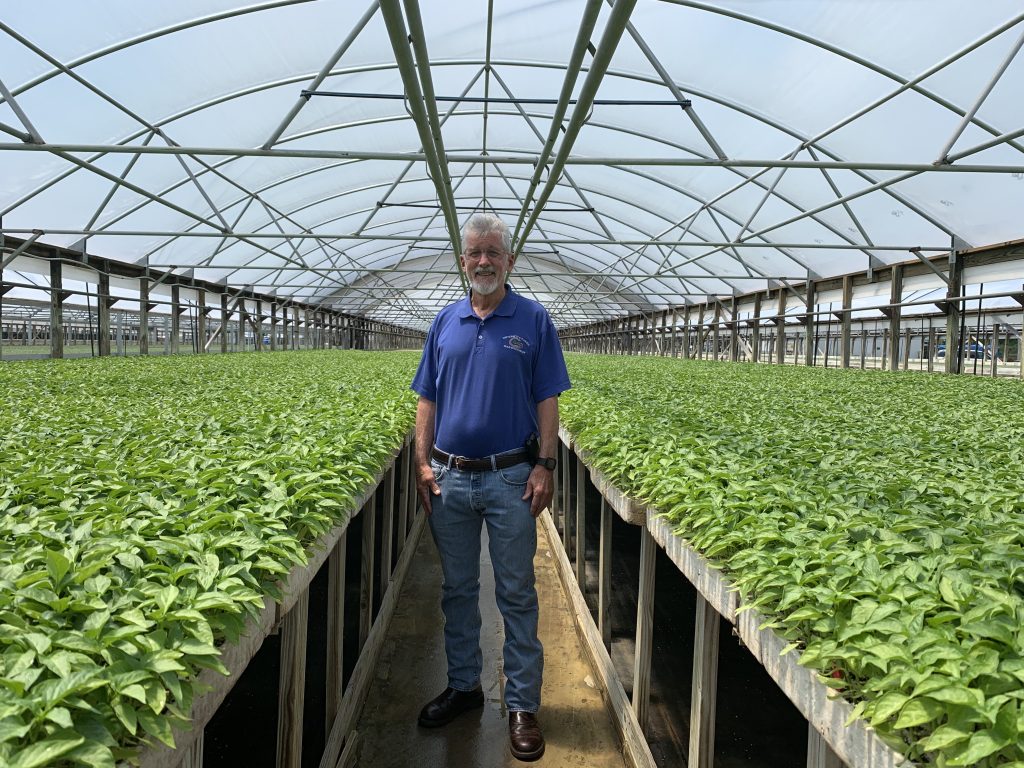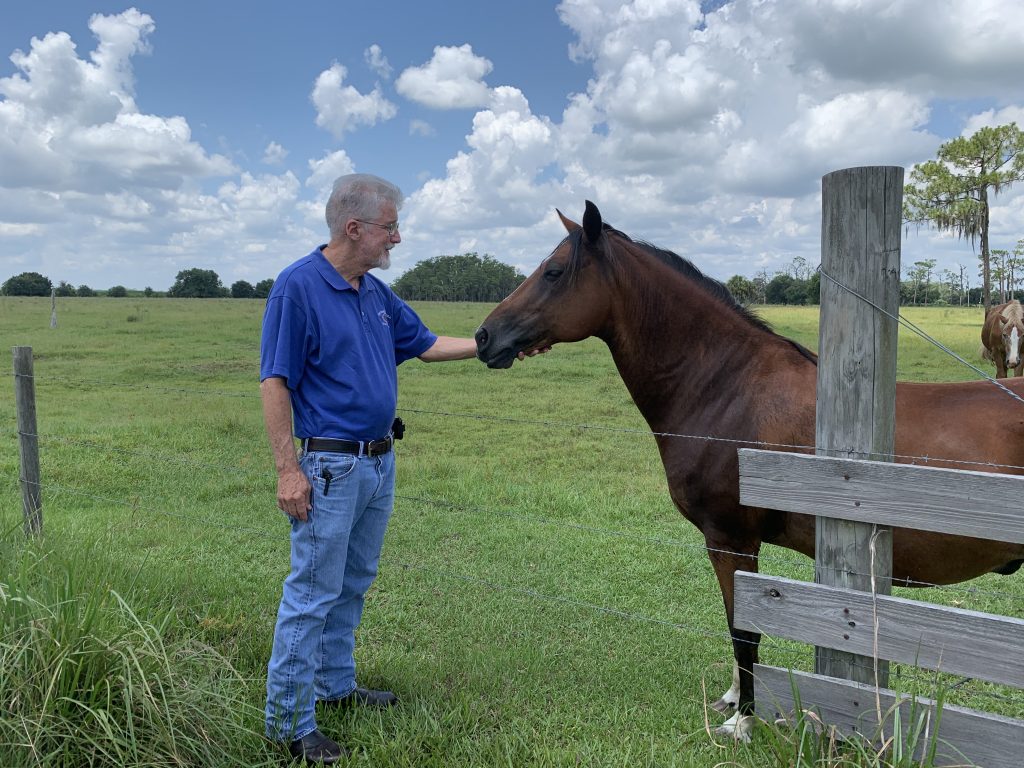University of Florida Extension Agent Gene McAvoy retires.

If you ask any Florida grower if they know who Gene McAvoy is, they’ll probably reply with a smile and say “yes.” That is the kind of impact McAvoy has had in his 22-year run as an Extension agent in Hendry County, Florida. On July 31, McAvoy officially retired from the University of Florida Hendry County Extension.
NORTHERN
BEGINNINGS, INTERNATIONAL CAREER
McAvoy grew up in
New Jersey, first living in the outskirts of Newark, then moving to southern
New Jersey later in his childhood. With New Jersey being dubbed the Garden
State, it was only natural for McAvoy to find his love for horticulture there.
When he was about 15 years old, he began working on a vegetable farm in the
summer to save money for college. “That kind of got me interested in
agriculture,” he said.
McAvoy’s dreams of going to college came true when he was accepted to Rutgers University. Being the first in his family to go to college, he didn’t have much guidance on how the process worked. When posed with the question of what he was going to study, he chose agriculture and earned a bachelor’s degree in plant science.
Upon graduating from Rutgers, McAvoy felt indebted to society after receiving numerous scholarships and other financial help that got him through school. So, he joined the Peace Corps, which sent him to Niger, a country in West Africa, and kick-started an international agricultural career.
For two years, McAvoy helped small vegetable farmers in Niger increase their yields and fend off pests and diseases. “It was really rewarding,” he said of the experience. “When you work here with big growers, it’s sometimes very hard to make a difference, but there you could make a big difference. So, it wasn’t unusual to help people double their yields or decrease their losses from pests by 30 percent.”
After has two-year Peace Corps assignment, McAvoy was asked to stay in Niger on behalf of the U.S. Agency for International Development (USAID). During that time in the mid-1970s, Niger suffered a devastating drought, which resulted in the deaths of people, animals and crops.
To assist, the U.S. government set up a seed multiplication facility since many people began eating the seeds that would normally be for planting because they had nothing to eat. McAvoy quickly came to play an instrumental role in the facility since he knew the native language and could act as an interpreter between the American breeders and local growers.
After working in Niger for five years and meeting his wife, McAvoy returned to his alma mater, Rutgers University, as an instructor in its new international program. “I became an adjunct professor … and I developed a short course on vegetable marketing,” he explained.
During his 4-year stint at Rutgers, McAvoy also earned his master’s degree. Now with a wife and two children, McAvoy’s international agriculture career continued when he received a job offer in Jamaica.
McAvoy was tasked with assisting a small vegetable growers cooperative that had six members. He went to Jamaica to help with their production practices, but he ended up doing much more. “When I got there, they didn’t need help growing anything. They were farmers; they knew how to grow. They just didn’t know how to sell it,” he said.
McAvoy helped the Jamaican growers find their market, which ended up being on the eastern coast of the United States. While he was originally tasked with helping the cooperative grow tomatoes and peppers, he soon realized consumers in other countries craving a taste of home would flock to Jamaican products. So, McAvoy began helping the growers produce and sell signature Jamaican produce.
Over seven years, the cooperative grew from six growers to more than 300 growers. Unfortunately, changes in governmental power forced McAvoy and his family out of Jamaica.
After returning to the states for some time, the family moved to Africa in 1994 for what would become McAvoy’s last international job. “It was a fantastic experience,” he said. “We were working with growers in Swaziland that were shipping produce into South Africa. It was a very successful project.”
Finally, the family settled in South Florida. After a long career traveling around the world, McAvoy was ready to put roots down in the states.
ENTER
EXTENSION WORK
After settling into
his new home in Florida, McAvoy started applying for Extension positions at the
University of Florida. He did so at the encouragement of a Pennsylvania Amish
farmer he met overseas. “You don’t know this, but you’ve been doing Extension
work your entire life,” the Amish farmer told McAvoy.

“I didn’t even know what Extension was at this point,” McAvoy said.
McAvoy applied for Extension work in every county, and he was denied by every county. However, after some encouragement from his wife, McAvoy called the University to see why the rejection letters kept flooding in. After some conversations and a series of interviews, McAvoy accepted a job as an Extension agent in Hendry County in 1997. “I took the job and I haven’t looked back,” he said.
CHANGES
AND CONNECTIONS
Most people cannot
wait to retire, but McAvoy is a special case. “I love my job,” he said with a
smile. “I don’t want to retire.”
Looking back on his Extension career, McAvoy can only describe it as a “fun ride.” Part of what makes it interesting is the constant change the industry faces in South Florida. “When I came here, we had about 300 farmers on 20,000 acres growing vegetables in the five-county area,” he explained. “But, over time … we’ve seen a huge consolidation … so our acreage has actually gone from 20,000 to 70,000. But the number of farmers and independent entities has gone from 300 to less than 100.”
Furthermore, South Florida has seen changes in crop diversity. An area that used to only consist of crops like tomato, pepper and watermelon now includes 60 different vegetables.
The best advice McAvoy can offer to his fellow Extension agents is to “become part of the village.”
“You have to immerse yourself in the community,” he said. “I think that’s made a difference for me.”
McAvoy’s favorite part about working in Extension has been working with farmers in South Florida. He said he’s made some of the best memories at grower meetings back in the day and out in the field. “It’s more than just work,” he said.
Since retiring from Extension, McAvoy has been doing everything he can to stay involved in the industry, and it continues to welcome him with open arms. He recently accepted a new position as associate director for stakeholder relations with the UF Southwest Florida Research and Education Center in Immokalee.
Gene McAvoy at a Glance
BIRTHDAY: August 27, 1952
EDUCATION: Bachelor’s and master’s degrees from Rutgers University
FAMILY: Wife Donna and three sons: Chris (engineer) married to Alvie with daughters Molly and Emma; Teddy (doctorate degree in horticulture) married to wife Cami with son Vaughn; and Andy who is working toward a doctorate degree in biochemistry at Georgia Tech
ASSOCIATION MEMBERSHIPS: National Association of County Agricultural Agents (president-elect), Florida Association of County Agricultural Agents, Joint Council of Extension Professionals, Florida State Horticultural Society, American Society for Horticultural Science, Florida Farm Bureau, Hendry County Cattlemen’s Association, American Society of Agronomy
BEST PART OF EXTENSION WORK: Working with people and helping them solve problems
WORST PART OF EXTENSION WORK: Bureaucracy and reports
FAVORITE HOBBIES: Traveling to new places, hunting, fishing, enjoying the outdoors
FAVORITE QUOTE: “Farming looks mighty easy when your plow is a pencil, and you’re a thousand miles from the corn field.” – Dwight D. Eisenhower









